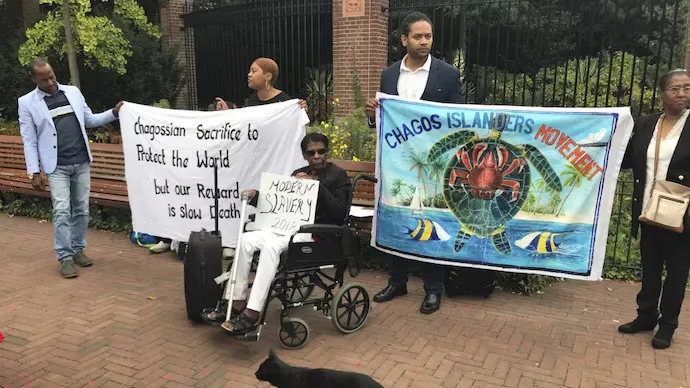The United Kingdom has agreed to transfer sovereignty of the Chagos Islands in the Indian Ocean back to Mauritius, effectively ending a decades-long dispute over the British-controlled territory. This move follows extensive diplomatic negotiations and a series of international rulings in favour of Mauritius’ claims.
The Chagos Islands, which include Diego Garcia, home to a major US military base, were unlawfully separated from Mauritius by the UK in the 1960s, a period marked by the forced expulsion of the native Chagossians. This controversial action, widely condemned as a crime against humanity, allowed the UK to retain control of the strategically located British Indian Ocean Territory (BIOT) even after Mauritius gained independence in 1968.
Decades of legal and diplomatic pressure
The decision to return the islands to Mauritius comes after 13 rounds of diplomatic negotiations that commenced in 2022. The breakthrough followed mounting international pressure, including key rulings from global judicial bodies. In 2019, the International Court of Justice (ICJ) ruled that the UK’s separation of the Chagos Archipelago from Mauritius was unlawful, asserting that the islands should be returned. The ruling was backed by the UN General Assembly and the International Tribunal for the Law of the Sea (ITLOS) in subsequent decisions. However, the UK initially resisted compliance, stating that the ICJ’s opinion was merely “advisory.”
This resistance continued for several years, but diplomatic momentum built as Mauritius, backed by international legal frameworks, continued to assert its rightful sovereignty over the islands. By 2024, following sustained international and diplomatic dialogue, the UK agreed to transfer control of the islands, with a critical exception regarding the military base at Diego Garcia.
Key provisions of the agreement
Under the terms of the agreement, the UK will retain control over Diego Garcia for military purposes, leasing the base to the US for an extended period of 99 years. Diego Garcia has been of immense strategic importance to both the UK and the US, serving as a key military outpost in the Indian Ocean, contributing to regional stability and US naval operations.
While Diego Garcia will remain under US control, the treaty is expected to grant the Chagossians the right to return to other islands in the archipelago, a move that addresses a long-standing demand from the displaced community. The forced expulsion of the Chagossians in the 1960s and 1970s continues to resonate as one of the most egregious violations of human rights linked to colonial legacies.
India’s role in the agreement
India has been a significant behind-the-scenes player in this diplomatic resolution. New Delhi, which has historically advocated for the return of the Chagos Islands to Mauritius, supported the agreement under the condition that the US retains its strategic base at Diego Garcia. This stipulation aligns with India’s broader security concerns, as Diego Garcia is crucial for maintaining the balance of power in the Indian Ocean, particularly in light of China’s growing naval presence.
As tensions rise with the Chinese People’s Liberation Army Navy (PLAN) expanding its reach near Indian waters, India’s backing of Mauritius’ sovereignty over the Chagos Islands ensures continued US-India cooperation in the region. The arrangement also aligns with India’s own strategic interests in the Indian Ocean, where it maintains a military base on *Agalega Island*, another Mauritian territory.
The deal between the UK, Mauritius, and the US is seen as a compromise that addresses the concerns of all involved parties—ensuring that US military capabilities remain intact, while Mauritius regains its sovereign rights, and India’s influence in the Indian Ocean region is preserved.
The Chagossians’ Right of Return
One of the most anticipated outcomes of this agreement is the right of return for the Chagossians. For decades, the displaced community has fought for their right to return to their homeland after being forcibly removed by the British government. While the treaty will likely exclude Diego Garcia from this provision, the remaining islands in the Chagos Archipelago will be accessible to the Chagossians, offering a semblance of justice after years of displacement.
The forced displacement of the Chagossians has been a central issue in the international criticism of the UK’s actions in the Chagos Islands. Families were uprooted and sent to live in poverty in Mauritius and the Seychelles, while their homeland was repurposed for military installations. Their right to return has long been a focal point in the global legal and human rights discussions surrounding the Chagos Archipelago.
Strategic significance of Diego Garcia
Diego Garcia remains a linchpin in US military operations across the Indian Ocean and beyond, hosting vital naval and air force facilities that support missions in the Middle East, Africa, and Asia. The base’s location provides a strategic vantage point for monitoring and responding to regional threats, and its significance is heightened by the ongoing tensions with China’s growing military assertiveness.
The UK’s agreement to transfer the rest of the Chagos Islands to Mauritius while retaining Diego Garcia as a military hub reflects the delicate balance of geopolitical interests in the region. The treaty preserves the operational integrity of the base while addressing Mauritius’ long-standing sovereignty claims, offering a resolution that had eluded diplomats for decades.
The transfer of the Chagos Islands to Mauritius marks a historic moment in resolving a contentious chapter of colonial history. With the involvement of multiple international bodies, the diplomatic support of India, and the strategic considerations of the US, the agreement offers a multifaceted solution to a complex issue.
The political and military future of Diego Garcia, meanwhile, remains a crucial element in the ongoing security dynamics of the Indian Ocean, as global powers continue to vie for influence in the region.






![Port Louis [Mauritius], Mar 11 (ANI): Prime Minister Narendra Modi gifts 'Makhana'- a super food from Bihar to Mauritius President Dharambeer Gokhool and First Lady Vrinda Gokhool, in Port Louis on Tuesday. (ANI Photo)](https://organiser.org/wp-content/uploads/2025/03/20250311203l-scaled-e1741750941361-120x66.webp)












Comments